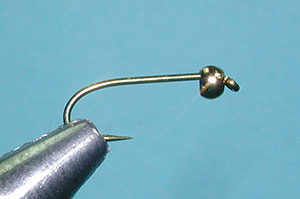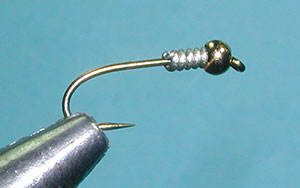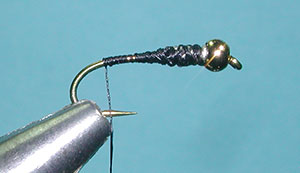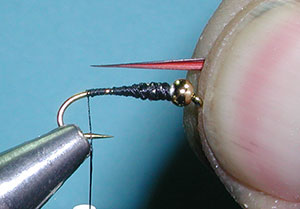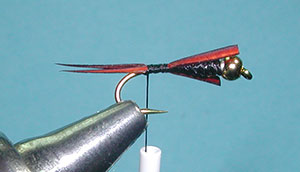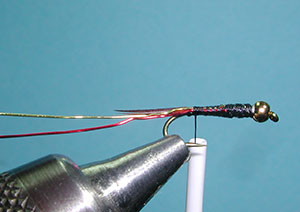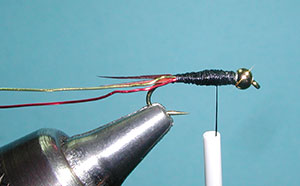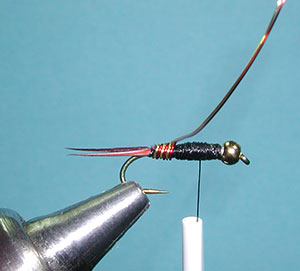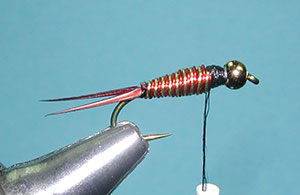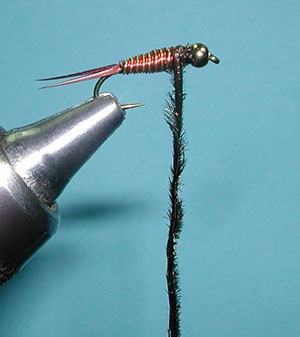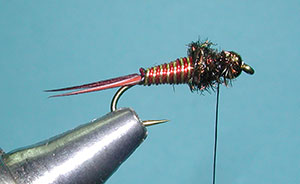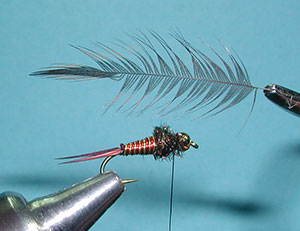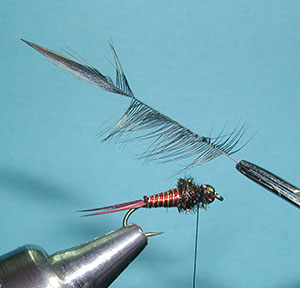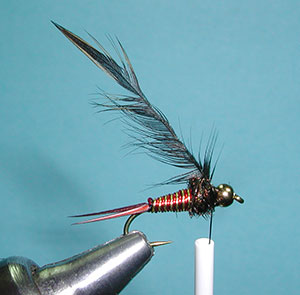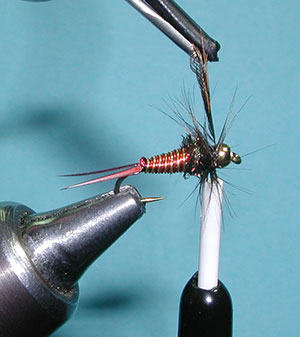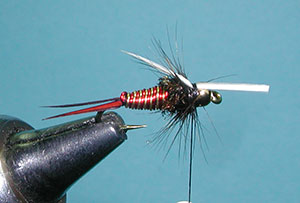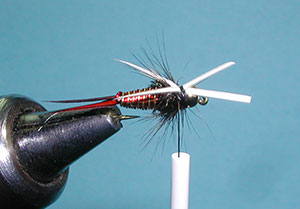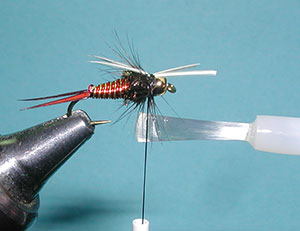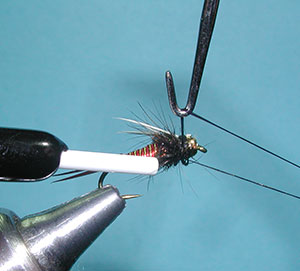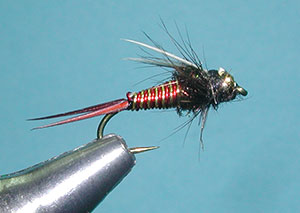Hot Wire Prince – better with a two tone segmentation
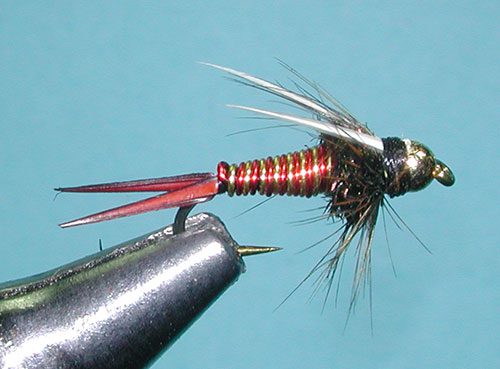
Hot Wire Prince (Yellow/Red)
Tying Instructions
| Materials
to Order Material, click the link |
|
|---|---|
| Hook | TMC 3761 #12-18 |
| Thread | Uni-Thread Black 8/0 |
| Head | Gold Tungsten Bead |
| Collar | Uni-Thread Black 8/0 |
| Weight | 0.020 Leadfree wire |
| Body | Yellow & Red Soft Wire, Size Medium |
| Tail | Brown Goose Biots |
| Thorax | Strung Peacock Herl |
| Wing | White Goose Biots |
| Hackle | Brown Hen Neck |
Hot Wire Prince
The Hot Wire Prince became a popular prince nymph variation soon after the Copper John was introduced by John Barr. I don’t know who actually originated this fly but the origins seem to be in Colorado where it became a popular choice for getting deep into the freestone rivers and streams.
Two colorations provide segmentation
Wapsi came out with various colorations of copper in 2001, so it was soon after that date that tyers would experiment with a two color wire body. Not only does the two color provide a distinct segmentation but the two colors will blend together to give a unique appearance. Popular colorations are Red/Yellow, Green/Yellow, Pink/Silver, and Brown/Gold. With movement, these colors will blend together so that the Green/Yellow will look a very buggy bright green.
Heavy pattern as an anchor fly
Like the Copper John and the Prince Nymph, the Hot Wire Prince is an attractor nymph but it is very effective in waters with caddis larvae and pupae. It can also represent small stoneflies. The weight of these patterns is a real plus for euro nymphing. Not only do you have the wire body but you can utilize a tungsten beadhead and add a leadwire underbody.
With this much weight, I prefer to use a small digital scale to figure out my fly selection with a multi-fly rig. With so much going on with a lead wire underbody and biot tails, it is important to create a smooth thread base underbody that tapers up to the thorax region. Once this is accomplished, the two wire wrap will have a smooth taper as well keeping the two wire close together. Bead suggestions: 7/64″ for size 12, 3/32″ for size 14-16, and 5/64″ for size 18.
Variations
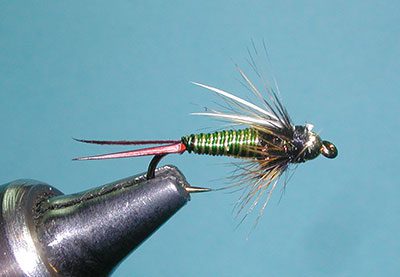
Hot Wire Prince (Green/Yellow)
| Hook | TMC 5262 #12-18 |
| Thread | Uni-Thread Black 8/0 |
| Head | Gold Tungsten Bead |
| Collar | Uni-Thread Black 8/0 |
| Weight | 0.020 Leadfree wire |
| Body | Green & Yellow Soft Wire, Size Medium |
| Tail | Brown Goose Biots |
| Thorax | Strung Peacock Herl |
| Wing | White Goose Biots |
| Hackle | Brown Hen Neck |
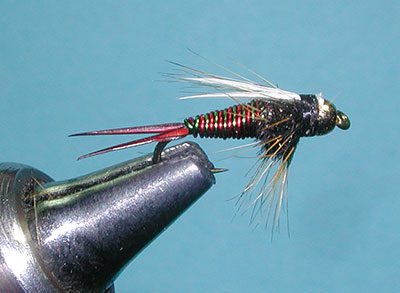
Hot Wire Prince (Green/Red)
| Hook | TMC 5262 #12-18 |
| Thread | Uni-Thread Black 8/0 |
| Head | Gold Tungsten Bead |
| Collar | Uni-Thread Black 8/0 |
| Weight | 0.020 Leadfree wire |
| Body | Green & Red Soft Wire, Size Medium |
| Tail | Brown Goose Biots |
| Thorax | Strung Peacock Herl |
| Wing | White Goose Biots |
| Hackle | Brown Hen Neck |
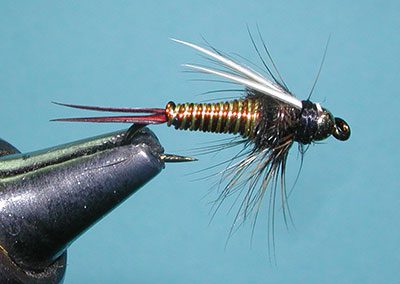
Hot Wire Prince (Brown /Gold)
| Hook | TMC 5262 #12-18 |
| Thread | Uni-Thread Black 8/0 |
| Head | Gold Tungsten Bead |
| Collar | Uni-Thread Black 8/0 |
| Weight | 0.020 Leadfree wire |
| Body | Brown & Gold Soft Wire, Size Medium |
| Tail | Brown Goose Biots |
| Thorax | Strung Peacock Herl |
| Wing | White Goose Biots |
| Hackle | Brown Hen Neck |

